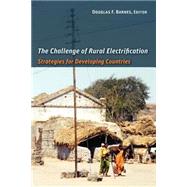The Challenge of Rural Electrification
, by Barnes, Douglas F.- ISBN: 9781933115436 | 1933115432
- Cover: Paperback
- Copyright: 7/1/2007
Douglas F. Barnes and his team of development experts provide an essential guide that can help improve the quality of life of the estimated 1.3 billion rural people in the world who are without electricity. The difficulties in bringing electricity to rural areas are formidable: Low population densities result in high capital and operating costs. Consumers are often poor and their electricity consumption is low. Politicians interfere with the planning and operations of programs, insisting on favored constituents. Yet, as Barnes and his contributors demonstrate, many countries have overcome these obstacles. The Challenge of Rural Electrification provides lessons from successful programs in Bangladesh, Chile, China, Costa Rica, Mexico, the Philippines, Thailand, and Tunisia, as well as Ireland and the United States. These insights are presented in a format that is accessible to a broad range of policy makers, development professionals, and community advocates. Barnes and his contributors do not provide a single formula for bringing electricity to rural areas. They do not recommend a specific set of institutional arrangements for the participation of public sector companies, cooperatives, and private firms. They argue instead that successful programs follow a flexible but still well-defined set of principles: a financially viable plan that clearly accounts for any subsidies; a cooperative relationship between electricity providers and local communities; and an operational separation from day-to-day government and politics.






